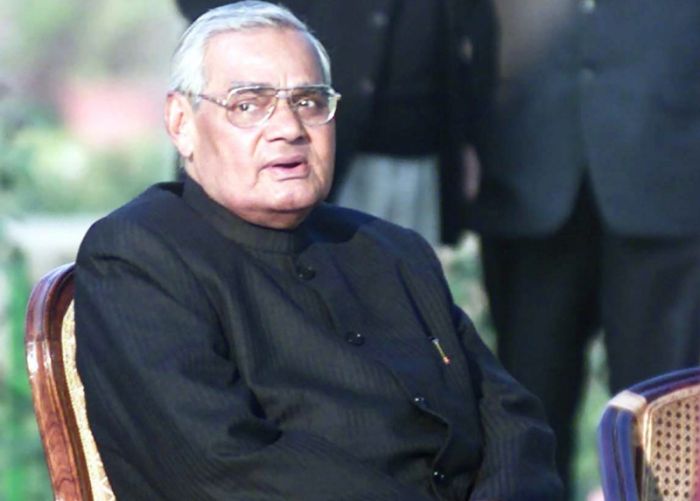The relationship between Kashmir and the Bharatiya Janata Party (BJP) has been fraught with complexities, shaped by decades of political turbulence, communal discord, and the volatile emotions of its populace. Yet, nestled within this intricate narrative is a rare exception: Atal Bihari Vajpayee, the former Prime Minister of India. Unlike other BJP leaders, Vajpayee found resonance in the hearts of Kashmiris — a people historically wary of the party he represented. This paradox is a testament to the nuanced dynamics of leadership, the power of empathy, and the importance of statesmanship in bridging divides.
The Man Behind the Reverence
Atal Bihari Vajpayee was not merely a politician; he was a statesman, poet, and a visionary who believed in humanity transcending political ideologies. His oratory skills, marked by grace and wisdom, coupled with his penchant for poetry, struck a chord even in a region as politically charged as Kashmir. Vajpayee’s ability to connect with people through his words and actions reflected his sincerity in addressing sensitive issues, including those concerning Kashmir.
The love Kashmiris harbored for Vajpayee stemmed from his distinct approach to the Valley’s issues. His vision was encapsulated in the three principles he articulated during his Srinagar visit in 2003: Insaniyat (humanity), Jamhooriyat (democracy), and Kashmiriyat (Kashmiri ethos). These words weren’t mere rhetoric; they symbolized his intent to address Kashmir’s grievances while respecting its cultural and historical identity.
Humanity Above Politics
Vajpayee’s concept of Insaniyat resonated deeply in a region scarred by violence and mistrust. Kashmir had long been subjected to policies that prioritized territorial integrity over human dignity. However, Vajpayee’s stance brought a refreshing perspective. He advocated for peace through dialogue and reconciliation rather than brute force — a significant departure from the hawkish rhetoric often associated with the BJP.
The ceasefire he announced during Ramadan in 2000 was a symbolic yet impactful gesture. Though it faced operational challenges, it reflected his willingness to offer an olive branch to separatists and militants. His government also facilitated the Lahore Summit with Pakistan in 1999, signaling his commitment to resolving the Kashmir issue through diplomacy rather than conflict. Such gestures, though politically risky, showcased his belief in prioritizing human lives and aspirations over narrow political gains.
Democracy: A Path to Reconciliation
Vajpayee’s emphasis on Jamhooriyat was equally significant. Democracy, for Vajpayee, wasn’t merely a procedural exercise but a means to empower people and address their grievances. His tenure saw a sincere attempt to restore political normalcy in Jammu and Kashmir, particularly through free and fair elections in 2002.
The 2002 elections marked a turning point, as they allowed the emergence of new political players, including the People’s Democratic Party (PDP). For the first time in years, Kashmiris felt their voices mattered. Vajpayee’s government refrained from manipulating the electoral process, an unfortunate hallmark of earlier regimes. This strengthened the democratic fabric of the state and instilled a renewed sense of political agency among its people.
Respecting Kashmiriyat
Perhaps the most profound aspect of Vajpayee’s approach was his respect for Kashmiriyat — the unique cultural and spiritual ethos of Kashmir. Unlike many leaders who viewed the Valley solely through a strategic lens, Vajpayee acknowledged its rich heritage and pluralistic identity. His efforts to engage with Kashmiri leaders, including separatists, reflected his respect for the region’s diverse voices.
During his Srinagar visit in 2003, Vajpayee emphasized the need for reconciliation and mutual respect. His words, “We can change friends, but not neighbors,” highlighted his pragmatic yet humane approach toward Pakistan and Kashmir. Vajpayee’s outreach wasn’t confined to political corridors; it extended to the people of Kashmir, fostering goodwill and bridging mistrust.
A Contrast in Leadership
Vajpayee’s legacy in Kashmir stands in stark contrast to the BJP’s current political strategies in the region. While Vajpayee sought to win hearts through dialogue, respect, and democratic processes, the recent trajectory has been marked by a unilateral and hardline approach. The abrogation of Article 370 in 2019, though legally and politically significant for the BJP, alienated a large section of Kashmiris. The subsequent clampdown on communication and civil liberties further deepened the chasm.
Kashmiris’ fondness for Vajpayee underscores a critical lesson for the BJP: leadership in sensitive regions requires empathy, flexibility, and an understanding of cultural nuances. Vajpayee’s success wasn’t a result of ideological compromise but a testament to his ability to adapt his principles to the needs of the moment. He demonstrated that even a leader from a party like the BJP, often viewed with suspicion in Kashmir, could command respect and affection if their approach resonated with the people.
Subtle Lessons for Today
For the BJP, Vajpayee’s legacy in Kashmir offers a roadmap for future engagement with the Valley. A few key takeaways stand out:
- Empathy and Dialogue: Addressing grievances through open communication is far more effective than enforcing compliance through force. Vajpayee’s willingness to engage separatists and Pakistan reflects the importance of dialogue in resolving conflicts.
- Respect for Diversity: Kashmir’s unique cultural identity cannot be subsumed under a monolithic national narrative. Recognizing and respecting its distinctiveness, as Vajpayee did, is crucial for building trust.
- Democratic Integrity: Allowing political processes to function freely and fairly strengthens democracy and fosters a sense of inclusion. The 2002 elections were a shining example of this.
- Long-term Vision: Vajpayee’s approach wasn’t driven by short-term political gains but by a vision of lasting peace. Such a perspective is essential for addressing Kashmir’s complex challenges.
A Legacy of Hope
Atal Bihari Vajpayee’s tenure as Prime Minister was a brief but luminous chapter in Kashmir’s history. His ability to rise above political compulsions and connect with the hearts of Kashmiris remains unparalleled. He showed that leadership is not about imposing authority but about earning trust — a lesson that transcends time and political affiliations.
As the BJP charts its course in Kashmir, it would do well to reflect on Vajpayee’s legacy. By embracing his principles of humanity, democracy, and cultural respect, the party can hope to rebuild its image and foster a genuine connection with the Valley’s people. For Kashmir, and indeed for India, Vajpayee’s legacy offers a timeless reminder of the power of compassion and statesmanship in healing even the deepest wounds.
10 Reasons Behind Kashmiris’ Love for Atal Bihari Vajpayee
The affection Kashmiris hold for Atal Bihari Vajpayee is deeply rooted in psychological principles that transcend political ideologies. His ability to connect with a population scarred by decades of conflict reflects a rare blend of emotional intelligence, empathetic leadership, and cultural sensitivity. Below are the psychological insights and 10 reasons why Kashmiris loved Vajpayee despite his association with the BJP:
- Empathy and Emotional Intelligence
Vajpayee’s emphasis on Insaniyat (humanity) resonated deeply with a population yearning for understanding and compassion. Unlike many leaders who viewed Kashmir through a strategic lens, Vajpayee’s words and actions reflected genuine concern for the emotional well-being of its people. This ability to empathize created a strong emotional connection.
- Symbolism of Peace
Vajpayee’s call for dialogue and his Ramadan ceasefire in 2000 were symbolic gestures that went beyond political calculations. These actions highlighted his desire to bring peace to a region mired in violence.
- Respect for Cultural Identity
By championing Kashmiriyat (Kashmir’s unique cultural ethos), Vajpayee validated the region’s distinct identity, which many Kashmiris feared was being eroded. His acknowledgment of their cultural pride fostered a sense of belonging and respect.
- Trustworthiness and Integrity
Vajpayee was perceived as a sincere and trustworthy leader. His measured demeanor, poetic eloquence, and consistent advocacy for dialogue and reconciliation contrasted sharply with the aggression often associated with political rhetoric on Kashmir.
- Tapping into Hope
In a region accustomed to despair, Vajpayee’s vision of “Insaniyat, Jamhooriyat, and Kashmiriyat” gave Kashmiris hope for a peaceful and dignified resolution to their challenges. This optimism was a powerful antidote to the prevailing cynicism.
- Non-Coercive Leadership
Vajpayee’s approach was marked by dialogue, restraint, and accommodation rather than coercion. His leadership style projected him as a unifier rather than an enforcer, earning him respect across divides.
- Genuine Outreach
Vajpayee extended an olive branch to Pakistan and Kashmiri separatists, signaling his commitment to resolving issues through diplomacy. His personal warmth during his Srinagar visit in 2003 further solidified his image as a leader who genuinely cared about Kashmir.
- Contrast with BJP’s Usual Image
Vajpayee’s compassionate and inclusive approach contrasted starkly with the hardline image often associated with the BJP. This contrast amplified his uniqueness and endeared him to those skeptical of his party.
- Poetic and Philosophical Persona
Vajpayee’s poetic sensibilities and philosophical outlook made him relatable and likable. His ability to articulate complex issues with simplicity and grace appealed to the Kashmiri ethos, which values intellect and culture.
- Legacy of Goodwill
The policies Vajpayee championed, such as free and fair elections in 2002, left a lasting impression of his commitment to empowering the people of Kashmir. His efforts were seen as sincere steps toward reconciliation and progress.
An author, a communications strategist, Dr Sanjay Parva was a debut contestant from 28-Beerwah 2024 Assembly Constituency





